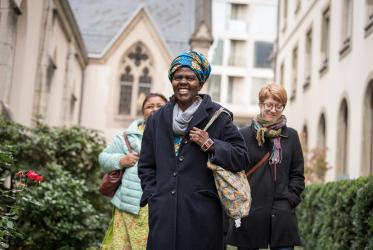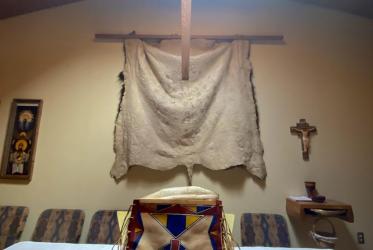Bible Studies on the Pilgrimage of Justice and Peace
"Pilgrimage toward Reconciliation" (Genesis 33:1–17)
By Yolanda Pantou*
God works through many ups and downs to shape us to be better persons,
living peacefully, despite our situation and challenges.
The Text
Now Jacob looked up and saw Esau coming, and four hundred men with him. So he divided the children among Leah and Rachel and the two maids. 2 He put the maids with their children in front, then Leah with her children, and Rachel and Joseph last of all. 3 He himself went on ahead
of them, bowing himself to the ground seven times, until he came near his brother.
4 But Esau ran to meet him, and embraced him, and fell on his neck and kissed him, and they wept. 5 When Esau looked up and saw the women and children, he said, “Who are these with you?” Jacob said, “The children whom God has graciously given your servant.” 6 Then the maids drew near, they and their children, and bowed down; 7 Leah likewise and her children drew near and bowed down; and finally Joseph and Rachel drew near, and they bowed down. 8 Esau said, “What do you mean by all this company that I met?” Jacob answered, “To find favor with my lord.” 9 But Esau said, “I have enough, my brother; keep what you have for yourself.” 10 Jacob said, “No, please; if I find favor with you, then accept my present from my hand; for truly to
see your face is like seeing the face of God—since you have received me with such favor. 11 Please accept my gift that is brought to you, because God has dealt graciously with me, and because I have everything I want.” So he urged him, and he took it.
12 Then Esau said, “Let us journey on our way, and I will go alongside you.” 13 But Jacob said to him, “My lord knows that the children are frail and that the flocks and herds, which are nursing, are a care to me; and if they are overdriven for one day, all the flocks will die. 14 Let my lord pass on ahead of his servant, and I will lead on slowly, according to the pace of the cattle that are before me and according to the pace of the children, until I come to my lord in Seir.”
15 So Esau said, “Let me leave with you some of the people who are with me.” But he said, “Why should my lord be so kind to me?” 16 So Esau returned that day on his way to Seir. 17 But Jacob journeyed to Succoth, and built himself a house, and made booths for his cattle; therefore the place is called Succoth.
Modern concepts of progress sometimes interfere with our pilgrimages of faith. For example, we often think that for our pilgrimage to be fruitful we must always be moving forward in life. In reality, our life journey sometimes takes a detour, stops, or even slides backward. In this Bible study we shall learn that even when we have to return to the place where we began, or even if we lose everything we have accumulated in life, that does not mean that we are not growing or progressing. As a matter of fact, we also grow (or progress) when we stop, turn back, and let go of things we deemed precious.
The biblical stories of families are helpful here. They are interesting, because they show that no family is perfect, and there is no clear separation between the protagonist and the antagonist. Everyone has a reason for his or her conduct and is responsible for his or her mistakes. We can use this perception to understand pilgrimage as an ongoing process of imperfect people, where mistakes happen, even among believers, in the midst of a pilgrimage.
Reflection
Being raised in a competitive family, in which both parents played favorites, Esau and Jacob’s sibling rivalry, which commenced in their mother’s womb (see Gen. 25: 22-23, 28), reached its peak in a family drama of manipulation, revenge, and break up.
The younger son, Jacob, grew up with ambitions to be greater than his older twin-brother, Esau. Jacob wanted to receive from his father the blessing of the firstborn. For this, Jacob tricked both Esau and his father, Isaac, with the help of his mother, Rebekah. How ironic that twin brothers who spent their early existence together could not stand each other as they grew up and wanted to spend the rest of their lives apart from one another. This rivalry reached its peak when, soon after their father passed away (Gen. 27: 41), Esau swore that he would kill Jacob. Their mother took this threat seriously. She told Jacob to flee until his brother’s wrath would ease, and she covered the escape as an effort to find a wife among her kin (another tricky scenario in their family). There are lessons here:
(1) We learn from Jacob’s life story that we cannot run away from our responsibility or our problem forever. There will come a day when we have to face it, whether with our head held high or with our tail between our legs. The principle of “what goes around, comes around” applied in Jacob’s life. Running away and seeking protection in his uncle’s house, Jacob the deceiver became the one who was deceived. From bride to cattle, his uncle Laban and his sons made a fool of Jacob again and again (Gen. 31: 6,7). Finally, when Jacob was no longer willing to be intimidated by his in-laws, he decided to secretly run away with his own family. Where to? Home, as God told him to do (Gen. 31: 3), fully understanding that he would eventually meet Esau on that road.
Facing what we fear is something that might happen in our pilgrimage of faith. Fear might manifest itself in the form of wrongs for which we need to make amends. It might manifest itself in the face of an enemy who shakes us to our core. It might manifest itself in a traumatic event that returns in our life (or in our fellow pilgrim). In the case of Jacob, when he faced his fear, his name became Israel, “because he has struggled with God and with men and has overcome.”[1]
(2) We also learn that the “resetting” of Jacob’s life journey did not take place only in facing the deceitfulness of Laban and Jacob’s family, but also when Jacob was willing to give away every possession that he had earned through hard work. The worldly and material blessing he pursued at the price of his relationship with his family became less important to him than forgiveness from Esau. This “reset” in Jacob’s journey was not a step backward, because spiritually he grew and finally came to peace with his past.[2]
(3) The third lesson we learn from this story is that a broken relationship is difficult to heal in one encounter. Once again Jacob lied to Esau when he said that he would catch up with Esau’s tribe; instead, he turned and went to another place. An ideal happy end, with reconciliation, does not always happen in our pilgrimage. This is not to discourage us from taking part in the pilgrimage, but to invite us to have realistic expectations and to learn to choose peace even in the face of disagreement and injustice.[3]
(4) The fourth lesson in this Bible study is from the perspective of Esau. He was ripped off of the blessings meant for him, and the future seemed bleak for him. However, over the years God blessed him with many possessions, and he was at peace with his life and with God. He had already forgiven Jacob before Jacob asked for his forgiveness. Many things in our pilgrimage do not come in the order that we want; forgiveness sometimes comes before apology; and blessing can come from a different source than we expect. Such is the beauty of pilgrimage. God works through many ups and downs to shape us to be better persons, living peacefully, despite our situation and challenges. God’s work of justice comes when we are ready to receive it, just as Jacob’s apology came when Esau’s anger had vanished.
Questions for Reflection and Discussion
- Do you ever feel stuck in your journey of faith or even sliding backward? What is the reason?
- Have you ever lost something big but thereby grown into something better?
- When you are not at peace with something or someone, can you move forward in your pilgrimage of faith?
Invitation for Action
1. Please read and discuss the story of Eva Kor, a Holocaust survivor, who embraced and forgave Oskar Groening, an SS guard.
2. Injustices in society and in our world leave many people in bitterness and anger. Some groups see other groups as the perpetrators (or the lucky ones), and it is difficult to live in harmony with each other when deep down inside there is this feeling of injustice. What can you do as an individual or as a church to bring peace to your society?
*Yolanda Pantou is a minister of the Gereja Kristen Indonesia (GKI), Indonesia.
[1] In Gen. 32:23–32, Jacob was afraid to face Esau. So he made everyone else cross the river Jabbok, while he stayed behind. That night, a man wrestled with him till the break of dawn and wrenched Jacob’s hip. Still, Jacob demanded that the man bless him. It is possible that Jacob was trying to kill himself when the man came and stopped him; that man gave Jacob the name Israel – as he was someone who had struggled with God and with another human being, and has overcome.
[2] We also learn here that compensation or reparation or restoration is needed in order to reach reconciliation. For Jacob to be willing to give some of his belongings to Esau is a gesture of apology. In many cases of conflict between nations, the perpetrator nation is required to give back what they have taken for reconciliation to be obtained.
[3] An Asian philosophy of harmony teaches people to avoid conflict, so that they do not later have to fix a broken relationship.


